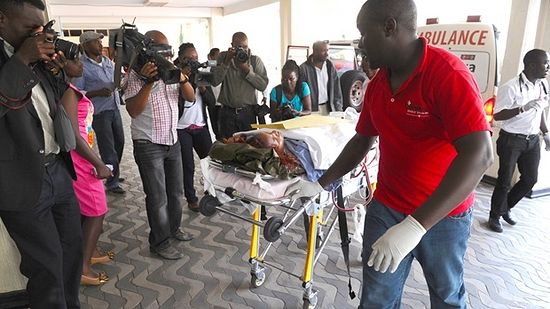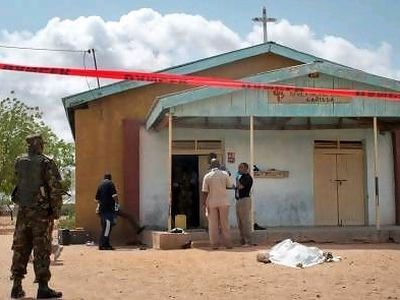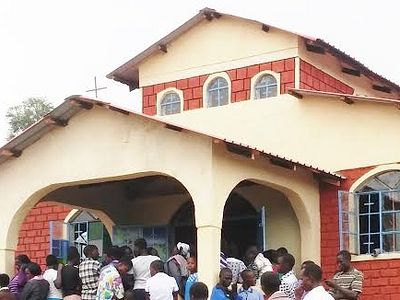Kenya, April 3, 2015
Christians were the primary targets of a terrorist attack on a Kenyan university that has left as many as 150 people dead.
A spokesperson for Al-Shabaab confirmed that the Somali militants had deliberately gone after Christians.
"There are many dead bodies of Christians inside the building. We are also holding many Christians alive," Sheikh Abdiasis Abu Musab, told Reuters.
Another Al-Shabaab spokesperson told the AFP that militants had "released the Muslims" but that they were holding others hostage.
"Our people are still there, they are fighting, and their mission is to kill those who are against the Shabaab," said Sheikh Ali Mohamud Rage said.
Eyewitnesses told CNN that gunmen arrived at Garissa University College early Thursday morning and took hostages from a morning prayer service.
Both World Watch Monitor and Morning Star News also covered the attack.
Taking hostages is a new strategy for Al-Shabaab, reported The Economist, noting that previous attacks by the group (including the 2013 Westgate mall massacre) have "focused solely on the business of killing" and that the group's "new tactic has raised fears as to what the gunmen’s intent may be."
Christian Solidarity Worldwide noted:
Al Shabaab attacks in Kenya have increased since October 2011, when Kenya’s army joined international efforts to stabilise Somalia following the cross-border abductions of foreign tourists by the group. It formally aligned itself with al Qaeda in 2012, although reports of foreign fighters amongst its ranks predated this announcement. There have been three attacks in the last two years in which the group has separated hostages according to religious identity and murdered them accordingly; the siege at Westgate Shopping Mall in September 2013, the hijacking of a bus travelling from Mandera to Nairobi in November 2014, and the attack on a quarry in Mandera in December 2014.
Last year, one regional expert suggested that the terrorist group was attempting to start a religious war in Kenya
"From a propaganda standpoint, I suspect that Shabaab is trying to play the role of a Robin Hood, swooping in at random to avenge the wrongs done to the Muslim communities," Bronwyn Bruton, deputy director of the Africa Center of the Atlantic Council in Washington, D.C., told The New York Times.
Elsewhere in Kenya, Al-Shabaab violence has caused trade unions to urge civil servants in northern Kenya, many of whom are Christians from the west who moved for work, to leave the area.
In December, quarry workers at a remote camp near the Somalia border were roused from sleep and questioned about their faith identities. Militants lined up those who could not prove they were Muslim and shot and killed 36; several were beheaded in their tents.
Anglicans, Seventh-day Adventists, Roman Catholics, and members of the Redeemed Gospel Church were among the Christians killed at the quarry, and church leaders told Morning Star News that “the attackers knew … very well that they were attacking non-Muslims.”
In January, Kenya jumped from No. 43 on last year’s World Watch List to No. 19—even though about 83 percent of Kenyans are Christians. A rash of religious violence over the summer left 100 dead. The country ranked fourth on the number of total number of Christians (119) who were killed for “faith-related reasons.”
Roughly 100 miles away from the Somali border, Garissa has been the victim of rising violence of Al-Shabaab's Islamist extremists. Authorities concerned that religious gatherings could easily cause violence have cracked down on street preaching by Christians and Muslims alike in Garissa.
After several churches were attacked in October, lawmakers rejected pleas from pastors from Mombasa, Kenya's second-largest city, who asked for the right to carry guns. Legislators defended their decision, arguing that arming the community would only increase insecurity and could result in the weapons ending up in the "the wrong hands."
Al-Shabaab’s gruesome terrorist attacks have drawn parallels to Nigeria’s Boko Haram, but the groups claim different motivations. While Boko Haram is opposed to Western education and religion, Al-Shabaab wants Kenya to pull its troops out of Somalia.
"The Boko Haram comparison doesn't apply," Yussuf Bashir, a Kenyan-Somali researcher at Northern Aid, a Nairobi-based NGO which works on both sides of the border, told The Economist last year. "These killings are not born of communal rivalry; the Shabaab are trying to push security services into reprisals against the community and win support that way."
CT looked at how Christian-Muslim relations in East Africa are going the violent way of Nigeria, what Kenya's violence means, and how Kenyan jihadist are enlisting ex-Christians as martyrs.
Elsewhere in the country, CT has reported on a Muslim restaurateur suing Kenya's Catholic bishops for discrimination, the country’s ban on building new churches amid a "miracle-faking spree," the polgyamy bill dividing its Christians, and pastors protesting pay-to-preach laws.




